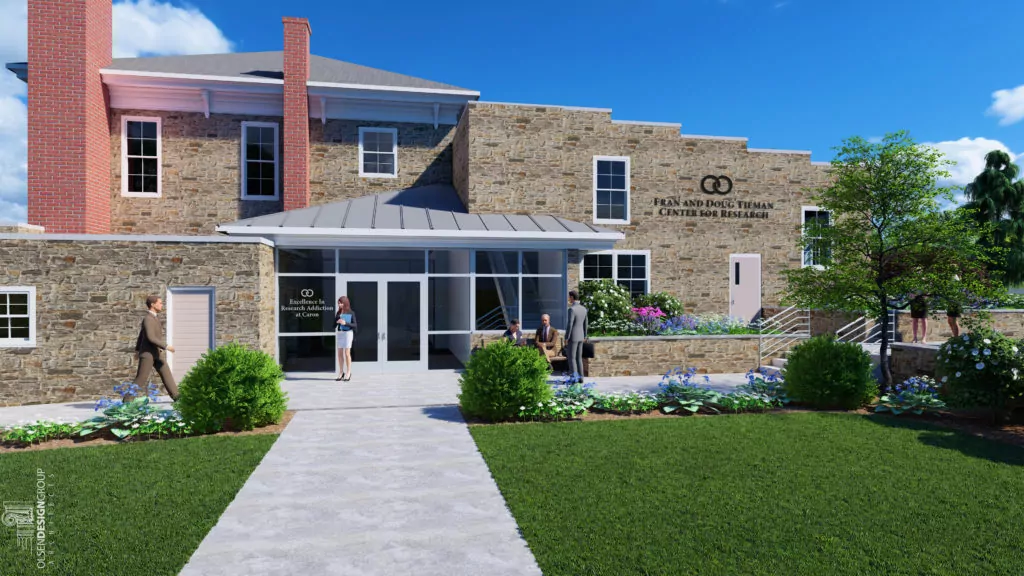The nation’s battle against substance use disorder (SUD) has reached crisis proportions, with overdose deaths hitting new highs. As such, fixing the problem calls for ever-inventive plans of attack, and one of the nation’s oldest SUD treatment providers is striking back with a new medical research center dedicated to addiction treatment.
Named the Fran and Doug Tieman Center for Research, Caron Treatment Centers is currently building the facility on its flagship campus and headquarters in Wernersville, Pennsylvania.
Dubbed by Caron as the “first-of-its-kind” research center to be located at a nonprofit addiction facility, the Tieman Center will open later this year. It will focus on brain chemistry and medical research, with the goal being to make measurable, objective advancements in the prevention and treatment of SUDs.
“It’s been a subjective field for so long,” Joseph Garbely — Caron’s chief medical officer and executive vice president of medical research and education — told Behavioral Health Business. “We really wanted to try to dig into that and change our field. That was the moonshot: to try to change [that] by pulling in objective measures.”
Founded in 1957, Caron provides the continuum of inpatient and outpatient SUD treatment to more than 5,000 people per year. In recent years, the nonprofit has made a name for itself in developing specialty treatment programs for groups such as teenagers, first responders, licensed health care workers and executives, among others.
Caron’s newest facility is named, in part, for Doug Tieman, Caron’s long-time CEO who retired last month. Tieman, who spent more than 25 years at the organization’s helm, now serves as a special advisor to Caron’s new CEO Bradley Sorte.
The center was largely inspired by the SUD treatment industry’s shortcomings. For years, addiction medicine has lacked objective measures, as it wasn’t considered a part of the mainstream health care system, Garbely said. That’s despite the fact that patients with SUDs frequently have medical comorbidities such as diabetes, cirrhosis and hypertension.
“Addiction medicine grew up outside of medicine … as a cottage industry, and we just haven’t had any real objectivity,” he said, noting that Caron wants to change that.
Over time, addiction medicine has slowly started to become more mainstream. For example, in 2015, it became a fully represented medicine specialty of the American Board of Preventive Medicine.
Additionally, the Accreditation Council for Graduate Medical Education (ACGME) — which accredits all graduate medical training programs for physicians — now has a fellowship program specifically for the identification and treatment of SUDs.
Caron has long sponsored ACGME fellows, as it has conducted addiction medicine research on its Wernersville campus for years. Now, the addition of the Tieman Center will allow Caron to expand that practice — as well as its research efforts overall — by giving the provider more privacy and real estate to work with.
The Tieman Center will recruit research participants from Caron’s other campuses in Pennsylvania, South Florida, Atlanta, New York City and Washington, D.C. Caron will also recruit participants who do not receive services at any of its locations. Currently, such recruitment is impossible for Caron.
“We just have one space right now, and we don’t have the space to do everything that we’re trying to do and everything we need to do,” Olapeju Simoyan, Caron’s founding medical director of research, told BHB. “Because of privacy concerns, we cannot bring research participants from outside of Caron into our current building. But now that we’re going to have a dedicated research center, we’ll be able to recruit patients from outside of Caron.”
The Tieman Center also stands to benefit Caron from a recruitment and training perspective. Both Garbely and Simoyan are faculty members at the Penn State University School of Medicine, and the two intend to leverage their connections to expand upon Caron’s higher education partnerships for the Tieman Center specifically.
Additionally, the new center aims to help get high school and college students interested in careers in addiction treatment. Since May, Caron has held virtual sessions for select groups of high school and college students in and around Wernersville, featuring health care professionals in fields like research and public health. Once the pandemic ends, Caron hopes to move those sessions in person to the Tieman Center.
“I think it’s very important to expose students in high school and college to various opportunities that are available to them,” Simoyan said. “Not everybody’s necessarily going to think, ‘I want to be an addiction medicine specialist,’ [because] they don’t even know what addiction medicine is, [and] they don’t even know what it takes to become a doctor. The important thing is to expose them to a variety of opportunities within health care.”
Using a steady mixture of private and public grants to facilitate its future work, Garbely said the Tieman Center could help solidify Caron’s role as an addiction treatment leader while expanding its footprint — and name recognition — even further.
“We certainly have heard the moniker over and over again that we’re the Mayo Clinic of addiction treatment,” Garbely said. “If we’re lucky enough to have an enduring brand like Mayo Clinic, that would be wonderful for us. I think the work we’re doing is capturing a tremendous amount of attention.”



